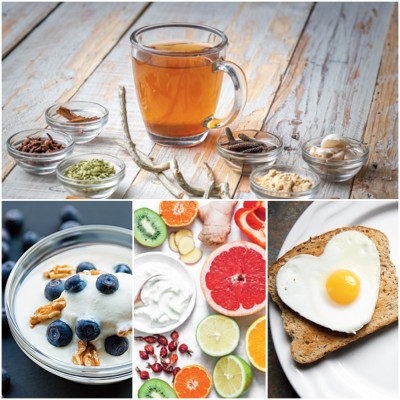The word ‘immunity’ is a much-used one in 2020. Recovery during the ongoing pandemic is much dependant on one’s immune system. The idea of boosting your immune system is appealing, but is it even possible to strengthen your immune system to cope with something like Covid-19? Let’s get our defence right.
What is immunity?
In simple words, immunity is our body’s natural defence system, which protects us from invasions by foreign substances. There are special mechanisms in place, which can destroy foreign substances, like bacteria, viruses, fungi, parasite; before they multiply and cause illness. The immune system is made up of special organs, cells and chemicals. The main parts of the immune system are white blood cells, antibodies, the complement system, the lymphatic system, the spleen, the thymus, the bone marrow and even the gut wall.
Two sub–systems of the immune system
The innate immune system or Natural Immunity: You are born with this and it is genetically determined. It’s your first line of defense from pathogens that try to enter the body, achieved through protective barriers, such as phagocytic cells, natural killer cells, mucus, stomach acids, enzymes and so on. All these mechanisms are present prior to exposure to infectious agents. The main job of this is to fight harmful substances and germs that enter the body through the skin or digestive system.
The adaptive immune system or Acquired Immunity: You develop this when your body is exposed to microbes or chemicals released by microbes. This system makes antibodies and uses them to specifically fight certain germs that the body has previously come in contact with. It has two categories.
Active immunity: It arises when the body’s own cells produce and remain able to produce antibodies following an attack of a disease or deliberate stimulation. Antibodies are manufactured specifically to deal with different diseases as they are encountered. Passive immunity: The production of immunity by artificial means by injecting ready-made antibodies. Babies have passive immunity conferred by antibodies from the maternal blood and colostrums to common disease for several weeks after birth.
Who is at risk?
All of us are at some risk from infection every day of our lives. However, some of us need to take particular care to keep our immune system working at its best. You are more prone to infection if you are:
◙ Recovering from any kind of illness.
◙ Work in a place where you interact with a lot people, such as schools, hospitals, call centres, banks as you are more likely to be exposed to various infections.
◙ The elderly.
◙ Children.
◙ If you are taking medications which suppress the immune system, like corticosteroids or anticancer drugs.
◙ Have poor health.
Balanced or Bolstered
The layman is faced with an onslaught of information (and misinformation) and wide range of products to boost immunity. However, the very concept of boosting immunity is unscientific and dangerously misleading. The only evidence-based approach to boost immunity is vaccination.
One must appreciate that your immune system, like most other things in life, need to function in a state of balance, neither more nor less. If it gets weak and sluggish, it can make you more prone to frequent infections, fatigue, headache and so on. Sometimes, if this group of special cells, tissues, and organs get overactive, you may end up with conditions like allergies, eczema and asthma. Or if your immune system gets hyper-excited and it starts to attack your body instead of protecting it, you can end up suffering from autoimmune disorders like type 1 diabetes, lupus and rheumatoid arthritis.
Moreover, if one tries to boost immunity in the absence of infection, he may experience inflammation in the body such as redness, soreness and pain.
Our approach should be to protect our immune system and make it function efficiently and try to exclude lifestyle factors that weakens it instead of boosting it.
Factors which reduce resistance and increase susceptibility to infections
◙ Overeating
◙ Obesity
◙ Lack of physical activity
◙ Lack of sleep
◙ Chronic stress
◙ Smoking
◙ Alcohol consumption
◙ Anger
◙ Engaging in arguments
◙ Strong sunlight
◙ Exposure to smoky atmospheres
◙ Taking antibiotics regularly

Eating enough nutrients as part of a varied diet is necessary for the health and function of all living cells, including immune cells. Sourced by the correspondent
Varied diet
Out of fear of contracting the virus, many of us have been rummaging around for superfoods or vitamin supplements that are believed to boost immunity. Vitamin C supplements, lemon water, concoctions made of various spices, hot beverages like green tea or tea with honey are popular choices. Our immune system is complex and is controlled by an ideal balance of many factors, not just diet, and especially not by any one specific food or nutrient.
The immune system, like all other body systems, needs the right fuel if it is to function efficiently. Malnutrition can impair the production and activity of immune cells and antibodies. It can be caused due to insufficient calorie intake resulting from reduced macronutrient intake such as protein. Vitamin and mineral deficiencies can also enfeeble our immunity. Suppressed, weakened immunity is common in later life, due to high incidence of undernutrition, protein-energy malnutrition and micronutrient deficiencies amongst the elderly. However, one must note that these markers of malnourishment are commonplace in the younger lot as well.
Eating enough nutrients as part of a varied diet is necessary for the health and function of all living cells, including immune cells. It is unlikely that individual foods offer special protection. So eat different varieties and colours of food, this is the best way to prevent nutrient deficiencies. The body’s immune response relies on the presence of many micronutrients. Nutrients that have been identified as critical for the growth and function of immune cells include protein, vitamin A, C, D, E, zinc, selenium and iron.
Betacarotene: It is converted into vitamin A in the body. It helps protect the immune system from the action of damaging free radical molecules. Vitamin A strengthens the skin inside and out, and therefore acts as a first line of defence and keep viruses and bacteria out of the body.
Sources: It is found in high concentration in yellow and orange fruits such as mango, papaya, watermelon, melon, apricot, sweet potato, carrot, red and yellow peppers.
Vitamin C: It stimulates our immunity by its ability to increase antibody production and speed the rate at which immune cells mature. Viruses cannot survive in a vitamin C-rich environment, making it an incredible antiviral agent. However, mega doses of vitamin C can cause diarrhoea and gastrointestinal disturbances. The US Food and Nutrition Board recommended a tolerable upper intake level (UL) for vitamin C of two grams daily.
Sources: Fruits like orange, sweet lime, grapefruit, kiwi, strawberry and Indian gooseberry (amla). Guava has more vitamin C than the orange, making them excellent source of the vitamin. Vegetables such as bell pepper, cabbage, broccoli, tomato, cauliflower also contain it.
Vitamin D: It enhances the function of immune cells including macrophages and T-cells that protect your body against pathogens. Deficiency of vitamin D can increase risk of respiratory infections.
Sources: Fatty fish like salmon, sardine, egg yolk, mushroom, fortified products such as cow’s milk, soy milk, cereals and orange juice.
Vitamin E: It is a powerful antioxidant and can protect immune cells from oxidative damage. In vitamin E deficiency, most of the immune parameters show a downward trend, which increases the risk of infectious disease. It is an important nutrient for maintaining the immune system, especially in the elderly.
Sources: Sunflower seeds, almond, spinach, avocado, squash, olive oil, broccoli.
Selenium: It keeps your immune system healthy. Deficiency of selenium has been shown to harm immune cell function and may lead to slower immune response.
Sources: Oyster, tuna, egg, sunflower seeds, chicken and shiitake mushroom.
Zinc: It is a crucial nutrient for the production and function of immune cells. Low levels of zinc have been shown to weaken the immune system.
Sources: Oyster, beef, lamb, shrimp, green peas, egg yolk, whole grain, peanuts, almond, cashew, pumpkin and flaxseeds, ginger root.
Taking a daily multivitamin is probably a good idea to stay healthy if you eat poorly, you are vegetarian or vegan. But taking mega doses of a single vitamin or supplement has not been proven to help the immune system.
What you should do if you are already fighting an infection
◙ Increase your liquid intake.
◙ Eat light. Avoid greasy oil and sugary foods.
◙ Make sure you get enough protein, which is needed to build up immune cells.
◙l If you have mucus-related infection, avoid dairy products with the exception of yoghurt.
◙ Add ginger to tea and consume four to six cloves of garlic.
◙ Increase your intake of fruits and vegetables rich in vitamin C and betacarotene.
◙ Add zinc supplement.
It is not that immune-healthy people do not fall sick. They do but they recover quickly. So, if you don’t want to suffer, adopt a healthy lifestyle for an efficient immune system.

Hena Nafis File Picture
Gut-friendly
A high-fibre plant-rich diet with plenty of fruits, vegetables, whole grains, and legumes appear to support the growth and maintenance of beneficial microbes, such as probiotics and prebiotics in the gut. The gut is a major site of immune activity and the production of antimicrobial proteins.
Healthy bacteria found in your gut is also used to stimulate the development of T-cells, responsible for distinguishing your body’s cells and tissue from potentially harmful pathogens and toxins. When there is an imbalance in your gut, such as an overgrowth of bad bacteria, it can confuse your immune system, causing it to start attacking your own cells leading to inflammation or leaky gut syndrome.
◙ Probiotic foods: Yoghurt, buttermilk, natural cheeses, pickles, fermented vegetables, sauerkraut, tempeh, kombucha tea, kimchi and miso.
◙ Prebiotic foods: Garlic, onion, leek, asparagus, banana, artichoke and seaweed.
Regular exercise
Physical activity may help reduce the risk of chronic diseases, like obesity and diabetes. Both these conditions have been linked to lower immune response. It also lowers blood pressure and improves cardiovascular health. It can also help you manage stress better, which will inadvertently improve your immunity. Exercise contribute to general well-being and therefore to a healthy immune system.
Restorative sleep
Lack of sleep has a profound effect on the immune system. While we sleep, a type of cytokine is released which can fight infection. Inadequate sleep reduces the amount of these cytokines in our bodies and can even lower other immune cells. Sleep debt cannot be compensated with naps or sleeping longer during weekends. Seven to nine hours is recommended each day for adults, and children need eight to 14 hours, depending on their age. But not just any sleep will suffice, you need restorative sleep for efficient immune function.
Calm mind
Chronic mental stress makes us prone to illness and disease. Stress triggers our brain to send signals to the endocrine system to release an array of hormones which severely depresses our immunity. The body’s ability to fight antigens are reduced for it lowers the number of lymphocytes and action of white blood cells. Reduce your levels of stress by engaging in regular physical activity, spending time with family, meditation or a visit to the spa.
Hena Nafis is a consultant nutritionist and the owner of nutrition and lifestyle clinic Nutrience, and the health cafe, Eat Good Food. You can follower her on Facebook and Instagram @officialhenanafis










